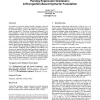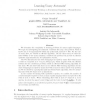219 search results - page 32 / 44 » Combinatorial Complexity of Regular Languages |
211
click to vote
POPL
2004
ACM
16 years 21 days ago
2004
ACM
For decades we have been using Chomsky's generative system of grammars, particularly context-free grammars (CFGs) and regular expressions (REs), to express the syntax of prog...
128
click to vote
EDBT
2009
ACM
15 years 4 months ago
2009
ACM
The classic Generalized Sequential Patterns (GSP) algorithm returns all frequent sequences present in a database. However, usually a few ones are interesting from a user's po...
JALC
2007
15 years 8 days ago
2007
We determine the complexity of learning problems for unary regular languages. We begin by investigating the minimum consistent dfa (resp. nfa) problem which is known not to be app...
126
Voted
JAC
2008
15 years 1 months ago
2008
Cellular automata are a simple model of parallel computation. Many people wonder about the computing power of such a model. Following an idea of S. Wolfram [16], M. Cook [3] has pr...
205
Voted
ICLP
2009
Springer
16 years 1 months ago
2009
Springer
Abstract. A class of probabilistic-logic models is considered, which increases the expressibility from HMM's and SCFG's regular and contextfree languages to, in principle...


